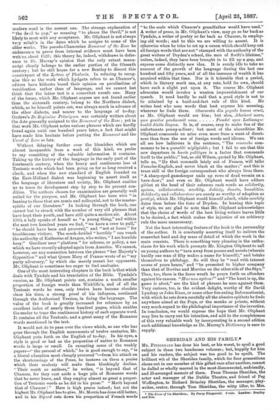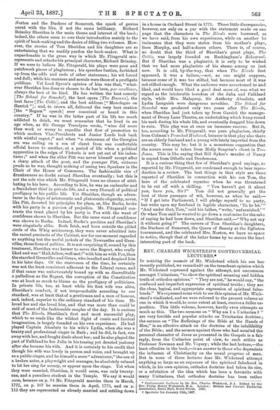SHERIDA.N AND HIS FAMILY.*
MR. FITZGERALD has done his best, or his worst, to spoil a good subject in these two handsome volumes ; but, happily for him and his readers, the subject was too good to be spoilt. The brilliant wit of the Sheridan family, which for four generations shone out in one member of this gifted race after another, cannot be dulled or wholly marred in the most disconnected, unfriendly, and ill-arranged memoir of them. From Thomas Sheridan, the actor and manager of the Dublin Theatre, and friend of Peg Woffington, to Richard Brinsley Sheridan, the manager, play- writer, orator, through Tom Sheridan, the witty idler, to Mrs.
• The Lit,., of the Sheridan', By Percy Fitagerald. 2 vole. Lontkral Bentley and Bon.
Norton and the Duchess of Somerset, the spark of genius ournt with the like, if not the same brilliancy. Richard Brineley Sheridan is the main theme and interest of the book; indeed, the others seem to owe their introduction mainly to the spirit of book-making and the desire of filling two volumes. How- ever, the stories of Tom Sheridan and his daughters are so entertaining that we readily pardon the book-maker. What is unpardonable is the gross way in which Mr. Fitzgerald mis- represents and attacks his principal character, Richard Brineley. If we were to believe Mr. Fitzgerald, his plays were poor and patchwork pieces of plagiarism ; his speeches fustian, furbished up from the odds and ends of other statesmen; his wit forced and dull ; while his manners and morals were those of a profligate publican. Yet Lord Byron's opinion of him was that, " what- ever Sheridan has done or chosen to do has been, par excellence, always the best of its kind. He has written the best comedy [The School for Scandal], the best opera [The Duenna], the best farce [The Critic], and the best address [" Monologue on Garrick "] ; and, to crown all, delivered the very best oration [the " Begnm " speech] ever conceived or beard in this country." If he was in the latter part of his life too mach addicted to drink, we must remember that he lived in an age when, as Sir George Trevelyan wrote, "wine did more than work or worry to expedite that flow of promotion to which modern Vice-Presidents and Junior Lords look back with wistful regret ;" and when "a statesman of the Georgian era was sailing on a sea of claret from one comfortable official haven to another, at a period of life when a political apprentice in the reign of Victoria is not yet out of his inden- tures ;" and when the elder Pitt was never himself except after a sharp attack of the goat, and the younger Pitt, virtuous prude as he was, thought nothing of seeing two Speakers in the Chair of the House of Commons. The fashionable vice cf drunkenness no doubt ruined Sheridan eventually ; but this is not the sole vice which Mr. Fitzgerald loses no chance of attri- buting to his hero. According to him, he was an embezzler and a fraudulent thief in Private life, and a very Disraeli of political profligacy in his public life. Yet Sheridan, though an adven- turer in the days of aristocratic and plutocratic oligarchy, never, like Pitt, deserted his principles for place, or, like Burke, broke with his party in a passion of prejudice. Mr. Fitzgerald con- trasts the trust placed by his party in Fox with the want of confidence shown to Sheridan. But the same want of confidence was shown to Burke. Indeed, Burke's position and Sheridan's were singularly alike. Both Irish, and born outside the gilded circle of the Whig aristocracy, they were never admitted into the sacred precincts of the Cabinet, nor for one moment regarded as anything but the useful jackals of the Newcastles and Oren- villas, those lions of politics. It is not surprising if, soared by this treatment, Sheridan was keener to serve the Regent, who really liked and was" Hail,fellow, well met?' with him as with Fox, than the starched Grenvilles and Greys, who insulted and despised him in his later days. Of the statesmen of the time, he certainly was not the least consistent adherent to the Liberal cause, and if that cause was unfortunately bound up with so discreditable a palladium as the Regent, the corruption of the Constitution was at least as much to blame as the profligacy of politicians. In private life, too, at least while his first wife was alive, Sheridan's conduct, if not irreproachable according to our standard, was at least that of a gentleman and a man of honour, and, indeed, superior to the ordinary standard of his time. He loved her and she loved him, and that was more than could be said of most of the fashionable couples of the day. It is carious that The Rivals, Sheridan's first and most successfal play, which to us reads like the wildest flight of comic and farcical imagination, is largely founded on his own experience. He had played Captain Absolute to his wife's Lydia, when she was a beauty and professional singer in Bath ; and he did, in fact, ran away with her, and fought duels about her; and he also played the part of Falkland to her Julia in his teasing yet devoted jealousy after she became his wife. And it is certainly to his credit that though his wife was lovely in person and voice, and brought up as a public singer, and ho himself a mere" adventurer," the son of a broken actor, a playwright and manager, he absolutely refused to let her sing for money, or appear upon the stage. Yet when they were married, Sheridan, it would seem, was only twenty- one, and a penniless student in the Temple. We say it would seem, because on p. 94 Mr. Fitzgerald marries them in March, 1772, on p. 107 he marries them in April, 1773, and on p. 113 they are represented as already married and settling down in a house in Orchard Street in 1771. Those little discrepancies, however, are only on a par with the statement made on one page that the characters in The Rivals were borrowed, as we have said, from his own experiences, while on another Ile insinuates that they were stolen from his mother's plays, from Murphy, and half-a-dozen others. There is, of course, no doubt that the third of Sheridan's great plays, The Critic, was largely founded on Buckingham's Rehearsal. Butif Sheridan was a plagiarist, it is only to be wished that we had more plagiarists of his stamp among us just now. It is odd, by-the-way, that when The Rivals first appeared, it was a failure—not, as one might suppose, because some of it was too stilted, but because most of it was not stilted enough. What the audience were accustomed to and liked, and would have liked a good deal more of, was what we regard as the intolerable boredom of the Julia and Falkland style, while Mrs. Malaprop, Sir Anthony Absolute, and Lydia Languish were dangerous novelties. The School for- Scandal was produced only two years after The Rivals, when Sheridan had just taken up from Garrick the manage- ment of Drury Lane Theatre, an undertaking which hung round his neck during his whole life, and eventually dragged him down- to ruin. This play was at once an immense success. But it, too, according to Mr. Fitzgerald, was pure plagiarism, chiefly from Colman's Provoked Husband, because in that play also there are an elderly husband and a young wife lately imported from the country. This may be ; but it is a monstrous suggestion that the screen scene is taken from Molly Seagrim's closet in Tom, Tones. This is like saying that Bill Sykes's murder of Nancy is copied from Othello and Desdemona.
It is a curious thing that few of Sheridan's good sayings, as reported by Mr. Fitzgerald, are condensed enough to bear repro- duction in a review. The best things in that style are those. reported of Sheridan in connection with his son Tom, the hero of the celebrated repartee when he was threatened. to be cut off with a shilling. "You haven't got it about you, have you, Sir ?" Tom did not generally get the best of these passages of wit, however, as when he said,— "If I get into Parliament, I will pledge myself to no party, but write upon my forehead in legible characters, 'To be let.' "And under that, Tom," said his father, "write, unfurnished.'" Or when Tom said he wanted to go down a coal-mine for the sake of saying he had been down, and Sheridan said,—" Why not say it without going 1" The careers of Tom Sheridan's daughters, the Duchess of Somerset, the Queen of Beauty at the Eglinton tournament, and the celebrated Mrs. Norton, we have no space to notice, though that of the latter forms by no means the least interesting part of the book.



































 Previous page
Previous page